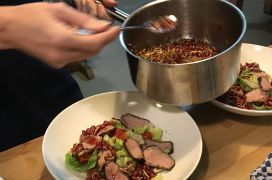Like nuts on legs

source: FoodPro Network International
HEERENVEEN - ‘Melt the butter in a frying pan. Put the heat on soft/medium. Bake the garlic in the butter for 5 minutes. Add the locusts. Continue baking for 10-15 minutes, stirring occasionally. Bon appetit!’ Well, how tasty would it be, fried locusts in garlic butter? On the website duurzaaminsecteneten.nl (sustainable insects eating) where this recipe can be found they say 'it tastes like nuts, but with legs.' That sounds pretty sympathetic.
In more than 100 countries in the world, especially in Asia and Africa, eating insects is very common. These are often caterpillars, locusts, mealworms, but sometimes also bees, ants and flies. Eating insects is called 'entomophagy' and is now completely hot, because they would be a good, healthy and sustainable source of protein. Arnold Huis, professor of tropical entomophagy at Wageningen University endorses this altogether. 'There are 3 million species of insects. Of these, 800,000 have now been described and only 5,000 are toxic. So, we could just eat the rest of them.’ The Netherlands Nutrition Centre is also positive about eating insects. 'They fit into a varied and healthy diet and contain protein, unsaturated fat, iron and vitamin B. In addition, insect meat is more sustainable to grow than meat, because insects convert their diet two to three times more efficiently than pigs or chickens and five times as efficient as cattle. Moreover, less water and space are needed and greenhouse gas emissions are much lower. '
A few practical hick-ups of course remain. People allergic to shellfish can also react to eating insects. You have to carefully remove the legs and wings for consumption, because they can cause damage to your intestines. The NVWA, the Netherlands Food and Consumer Product Safety Authority, therefore recommends that you should not eat more than 45 g in connection with the chitine that is present in the legs and skeleton, which could be harmful to humans. There are no rules yet for selling insects as food. The EU has not considered this yet, and allows sales for the time being.
Besides, we all eat insects. Because unnoticed, when harvesting crops, insects come along, which you find in small particles in bread and pasta, for example. In sweets like M&M's and pink cakes, there is an excretion product of Indian lice, for a sweet tooth no problem at all. The advantages therefore seem to be well outweighed by the disadvantages. What does stop us from attacking on a delicious Bee-LT sandwich or putting our teeth in a nutritious bug bar? Yes, this is it. We eat with our eyes, and that's exactly the problem here.
We test insect eating ourselves during an insect cooking workshop. As a group, we make a challenging three-course menu with locusts, buffalo worms, triobolo worms and crickets. Our workshop leader says: 'It isn't really efficient, those insects. You have to eat a lot of them to fill your stomach.’ So, we're getting started with roasting meat, filleting fish, cooking potatoes, blanching vegetables and making chocolate sauce. And we use the insects as a supplement, for example in the appetizer of beef on a bed of lettuce and tomato with a nice dressing of pomegranate and triobolo worms, and in the brownie with buffalo worms. No one had a problem with consuming the dishes. But the insects were more decoration than basic ingredient and without them it would have been delightful too. No one found the insects taste like nuts, but anyhow, that's what we have nuts for - recently revalued as healthy. Nuts without legs, to be precise.
TEN the export network offers advice and support to food & beverage companies that dare to look across borders. We coordinate export activities, stimulate business development projects and set up new international routes. TEN professionalizes existing export activities and we are consultants working for the SIB program (Starters International Business Program of the RVO, Dutch Government) for SME companies. For more information: www.theexportnetwork.nl or contact us for an appointment: http://www.theexportnetwork.nl/contact/.
Source: TEN the export network - partner FoodPro Network International
Latest news
-
11 jan Nestlé Vietnam invests $100 million in coffee factory to meet growing consumer demand
-
11 jan TraceGains' Together Conference 2024
-
11 dec Alex Holt appointed Chief Sustainability Officer of Ahold Delhaize
-
29 nov Nestlé develops N3 milk with new nutritional benefits, launches first in China
-
21 nov Grocery shopping in Australia
-
20 nov Centuries-old-fermentation technique all hot again
-
12 sep The limits of exports
-
18 aug Detecting and Preventing Coffee Fraud
-
14 aug Connecting the world of food professionals
-
10 aug Sky-high expectations for vertical agriculture
Join the conversation
Are you already a member? Please
Login
Don't have an account yet? Please register